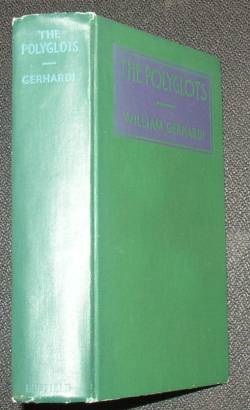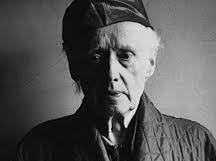Polyglots by William Gerhardi. New York. 1925. Duffield & Company. hardcover. 375 pages.
 FROM THE PUBLISHER -
FROM THE PUBLISHER -
THE POLYGLOTS, Gerhardie’s comic masterpiece, is the unforgettable tale of an eccentric Belgian family living in the Far East through the uncertain years after the First World War and the Russian Revolution. The tale is recounted by their dryly conceited young English relative Captain Georges Hamlet Alexander Diabologh, who comes to stay with them during his military mission to the East. Filled with a host of bizarre characters - depressives, obsessives, paranoiacs, sex maniacs, hypochondriacs - Gerhardie paints a wonderfully absurd and directionless world where the comic and tragic are irrevocably entwined.

William Alexander Gerhardie (1895-1977) was a British (Anglo-Russian) novelist and playwright. Gerhardie (or Gerhardi: he added the ‘e’ in later years as an affectation) was one of the most critically acclaimed English novelists of the 1920s (Evelyn Waugh told him ‘I have talent, but you have genius’). H.G Wells was a ferocious champion of his work. His first novel Futility, was written while he was at Cambridge and drew on his experiences in Russia fighting (or attempting to fight) the Bolsheviks, along with his childhood experiences visiting pre-revolutionary Russia. Some say that it was the first work in English to fully explore the theme of ‘waiting’ later made famous by Samuel Beckett in WAITING FOR GODOT, but it is probably more apt to recognize a common comic nihilism between those two figures. His next novel, THE POLYGLOTS is probably his masterpiece (although some argue for DOOM). Again it deals with Russia (Gerhardie was strongly influenced by the tragi-comic style of Russian writers such as Chekhov who he wrote a study of while in College). He collaborated with Hugh Kingsmill on the biography ‘The Casanova Fable’, his friendship with Hugh being both a source of conflict over women and a great intellectual stimulus. After World War II Gerhardie’s star waned, and he became unfashionable, and although he continued to write, he had nothing published after 1939. After a period of poverty-stricken oblivion, he lived to see two ‘definitive collected works’ published by Macdonald (in 1947-49 and then revised again in 1970-74). More recently, both Prion and New Directions Press have been reissuing his works. Asked how to say his name, he told The Literary Digest ‘Pronounced jer (as Ger in Gerald) hardy, with the accent on the a: jer-har’dy. This is the way I and my relatives pronounce it, tho I am told it is incorrect. Philologists are of the opinion that it should be pronounced with the g as in Gertrude. I believe they are right. I, however, cling to the family habit of mispronouncing it. But I do so without obstinacy. If the world made it worth my while I would side with the multitude.’ (Charles Earle Funk, What’s the Name, Please?, Funk & Wagnalls, 1936).